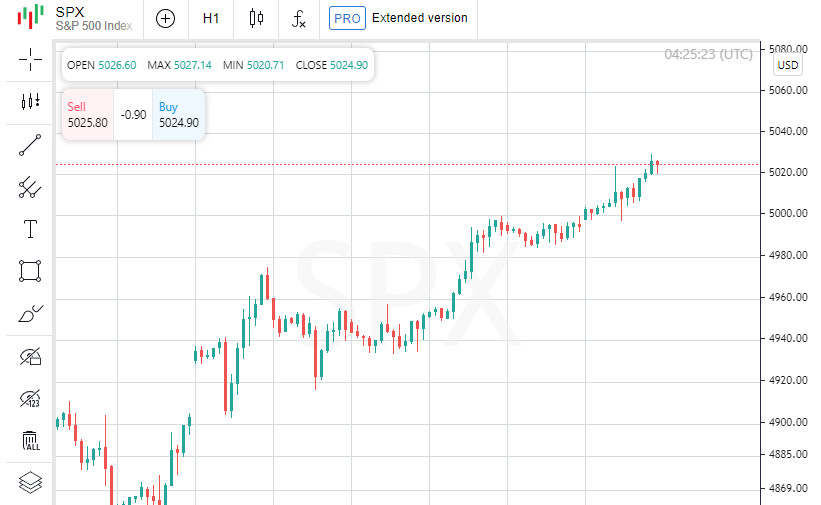
The global stock index MSCI All Country (.MIWD00000PUS) increased by 0.4%, marking its third consecutive weekly gain.
The S&P 500 index closed above 5000 for the first time on Friday, and Nasdaq briefly traded above 16,000, thanks to growth from large corporations and chip manufacturers, including Nvidia, as investors focused on artificial intelligence technologies and expected high profits.
Shares of Nvidia (NVDA.O) jumped 3.6%, reaching a record high after Reuters reported the creation of a new business unit focused on developing specialized chips for cloud computing companies and others, including advanced AI processors.
This followed a Wall Street Journal report that OpenAI CEO Sam Altman was negotiating with investors to fund a technology initiative aimed, among other things, at increasing chip production for powerful artificial intelligence.
"So far, the AI story has been about building infrastructure, chips, and data centers," said David Lefkowitz, head of US equities at UBS Global Wealth Management, adding that it "highlights potentially huge demand for AI infrastructure in the future."
Besides the 1.99% increase in the Philadelphia Semiconductor Index, contributions were also made by technology giants, including Microsoft (MSFT.O), Amazon.com (AMZN.O), and Alphabet (GOOGL.O), to index profit.
According to LSEG data, with results from about two-thirds of S&P 500 companies, Wall Street's earnings growth expectations for the fourth quarter are now 9.0% compared to 4.7% at the start of January, with 81% of companies exceeding estimates compared to an average of 76% over the last four reporting periods.
Strong corporate earnings, positive employment data, GDP, and decreasing inflation create a favorable backdrop for further stock market development.
Consumer prices in the US for December rose less than initially expected, but core inflation remained somewhat high, as data released on Friday showed. The data revision changed little in the expectations for changes in the Federal Reserve's rates.
Inflation data for the US in January is expected next week.
The Dow Jones Industrial Average (.DJI) fell by 54.64 points, or 0.14%, to 38,671.69, the S&P 500 (.SPX) added 28.70 points, or 0.57%, to 5,026.61, and the Nasdaq Composite (.IXIC) grew by 196.95 points, or 1.25%, to 15,990.66.
Positive earnings and optimism regarding artificial intelligence helped the S&P 500 index achieve ten intra-day record highs this year.
Nasdaq closed just 0.4% below its record closing high of 16,057.44, registered in November 2021.
Over the week, all three indices recorded their fifth consecutive weekly gain: S&P rose by 1.4%, Nasdaq by 2.3%, and Dow by 0.04%.
Earlier data showed that consumer prices in the US for December rose less than initially expected, but core inflation remained somewhat high - a mixed picture that clouded expectations regarding the timing of the Federal Reserve's interest rate cuts.
Strong economic data and recent comments from Federal Reserve officials dispelled hopes that the central bank would start cutting interest rates in March.
Market participants are waiting for consumer price data for January next week to get more clues about when the Fed will reduce borrowing costs.
It's also worth noting that shares of Cloudflare (NET.N) rose by 19.5%, as optimistic revenue and profit forecasts for the first quarter were expected. However, shares of PepsiCo (PEP.O) fell by 3.6% after its fourth-quarter revenue fell short of estimates, as multiple price increases reduced demand for its juices and Lay's chips.
Shares of Pinterest (PINS.N) fell by 9.5% after the company forecasted first-quarter revenue significantly below Wall Street estimates.
The yield on benchmark 10-year US Treasury notes rose by 0.7 basis points to 4.177% from 4.17% late on Thursday.
The yield on 2-year notes, which typically moves in step with interest rate expectations, increased by 3.2 basis points to 4.4883% from 4.456%.
Gold prices were pressured by higher yields: spot gold fell by 0.44% to $2024.16 per ounce. Futures on American gold decreased by 0.4% to $2038.7.
Futures on Brent crude oil increased by 0.7% to $82.19 per barrel, while futures on American oil rose by 0.8% to $76.84.
European stocks closed slightly lower under the influence of rising yields and falling shares of L'Oreal.
The pan-European STOXX 600 index closed down by 0.1%, but still showed a weekly gain of 0.2%.
Shares of L'Oreal fell by 7.6% after the French cosmetics company reported unsatisfactory sales growth in the last quarter.
Inflation in Germany, Europe's largest economy, fell in January to 3.1%, fueling bets on when the European Central Bank will start cutting interest rates.
However, the yield on eurozone bonds reached a multi-week high after several ECB rate-setters warned against prematurely easing monetary policy.
"Indeed, it now seems entirely evident that the ECB will wait for wage statistics in Europe at the end of April before likely cutting rates in June," said ING.
Japanese stocks reached a 34-year high. The yen recovered after falling to a 10-week low as traders reassessed their bets on how quickly the Bank of Japan might raise rates.
In China, mainland markets were closed, and in Hong Kong, trading was sluggish and ended early, with the Hang Seng index falling by 0.8% amid concerns that authorities might not fulfill promises to support.
 English
English 
 Русский
Русский Bahasa Indonesia
Bahasa Indonesia Bahasa Malay
Bahasa Malay ไทย
ไทย Español
Español Deutsch
Deutsch Български
Български Français
Français Tiếng Việt
Tiếng Việt 中文
中文 বাংলা
বাংলা हिन्दी
हिन्दी Čeština
Čeština Українська
Українська Română
Română

